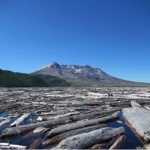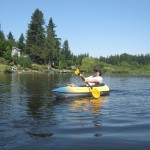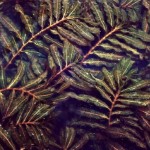What role do floating logs play in lake ecology?
by Jim Gawel
 It’s an odd question, but an intriguing one. Natural disturbances such as landslides, high winds, and streambank erosion can add significant amounts of floating woody debris to lakes. However, humans often remove this material for salvage logging or to prevent boat damage in accessible lakes. The role of floating woody debris in lakes has been largely ignored in the study of lake ecosystems
It’s an odd question, but an intriguing one. Natural disturbances such as landslides, high winds, and streambank erosion can add significant amounts of floating woody debris to lakes. However, humans often remove this material for salvage logging or to prevent boat damage in accessible lakes. The role of floating woody debris in lakes has been largely ignored in the study of lake ecosystems
Monitoring King County’s smaller lakes for water quality
by Sally Abella and Rachael Gravon
 The largest lakes in King County, including Washington, Sammamish, and Union, have been monitored for water quality for many years as their watersheds have been developed and sewage systems installed and updated, while area population has grown tremendously. However, King County also has many smaller lakes across the landscape, a legacy of the last large glaciation more than 10,000 years ago. Many of the lowland lakes have interesting histories, whether they were used as logging mill ponds, served as summer resorts for city dwellers, or, more recently, as focal points for residential development on the urban fringes. Quite a few have public boat launches managed by the Washington Department of Fish and Wildlife (WDFW).
The largest lakes in King County, including Washington, Sammamish, and Union, have been monitored for water quality for many years as their watersheds have been developed and sewage systems installed and updated, while area population has grown tremendously. However, King County also has many smaller lakes across the landscape, a legacy of the last large glaciation more than 10,000 years ago. Many of the lowland lakes have interesting histories, whether they were used as logging mill ponds, served as summer resorts for city dwellers, or, more recently, as focal points for residential development on the urban fringes. Quite a few have public boat launches managed by the Washington Department of Fish and Wildlife (WDFW).
Don’t miss the annual WALPA conference!
 Register now for the 27th annual WALPA conference in Chelan from September 30 to October 2!
Register now for the 27th annual WALPA conference in Chelan from September 30 to October 2!
https://www.walpa.org/walpas-27th-annual-conference/
To submit an abstract, please visit: https://www.walpa.org/annual-conference/
Students, make sure to submit your posters for the student poster contest – the best one gets a $100 prize!
We have reserved a block of rooms for the conference at Campbell’s Resort. Rooms are expected to fill up fast, so book your room now!
Can we predict what Washington lakes are most vulnerable to plant invasion?
by Julian Olden, University of Washington
Prevention is key to managing aquatic invasive species, yet is highly challenging when the landscapes to be managed include thousands of lakes, multiple invasive species, and limited resources for action.
Julian Olden and his colleagues at the University of Washington recently developed statistical models to help prevention efforts by identifying the locations most vulnerable to future invasion
WALPA scholarships awarded from strong field
The Washington Lakes Protection Association awards two scholarships each year: the Nancy Weller Memorial Scholarship and the David Lamb Memorial Scholarship, both named in honor of long-term influential members of WALPA. Candidates for these competitive scholarships must be students currently enrolled at a college or university proposing to undertake research on the biology, ecology, hydrology, and management or restoration of lakes and watersheds in Washington or Idaho.










